
No grade due to multiple conflicts of interest (click on the comments to read all of them)
Alexandra Hofmaenner, the communications director at Stewart Hall stopped by last week and asked me if I wanted to come see the show, as she drives and has a car, I jumped at the opportunity.
First off, if I had titled the show, I would have figured out a non-literal translation - it was only three days after I had seen the show (and 30 minutes before I read the press release which spelled it all out in neon letters) that it suddenly dawned on my that "nature morte" is "still life" in English. Off the top of my head one idea that I think would have worked better is "Life Wanted: Still or Moving." "Cuz as I was there I was having a real hard time trying to comprehend what the still life paintings and photographs were doing hanging out check to jowl with the rather abstract and witty pieces of art that used nature as their foundation.
Off the top I really liked Doris May's table and chair set-up,
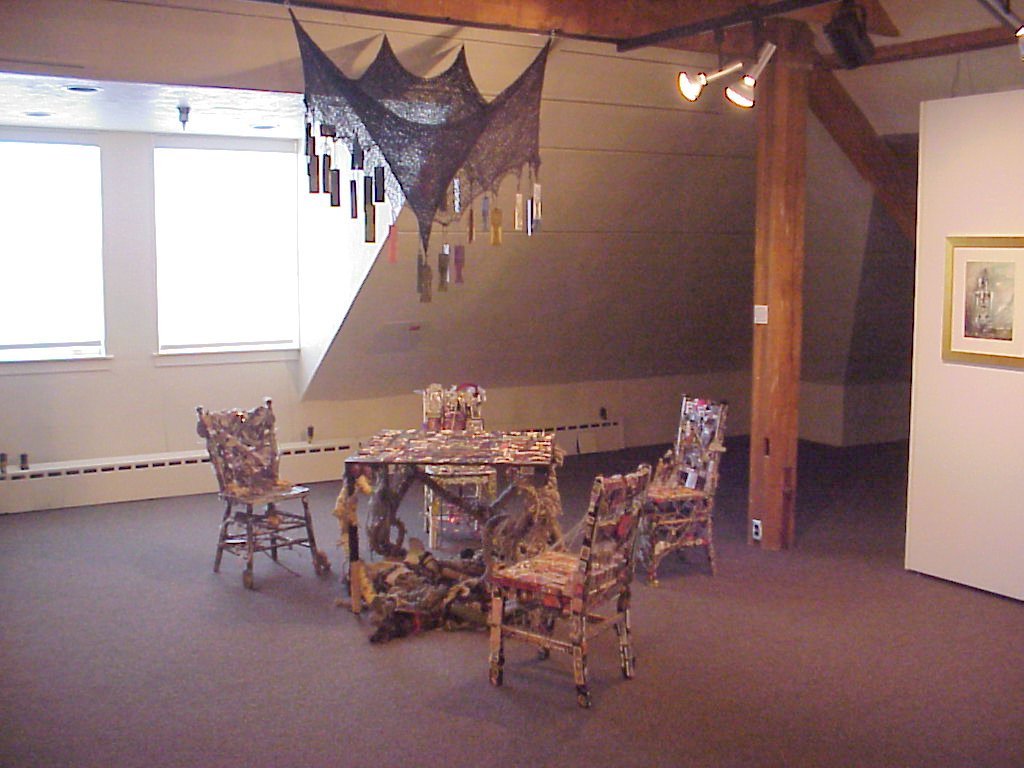
Doris May, You Are Invited to Dinner, 2000-2006, mixed media
I also have notes here reminding me that I was particularly taken with Louis Joncas' photographs, Reinhardt Reitzenstein's thing-a-ma-bobs,
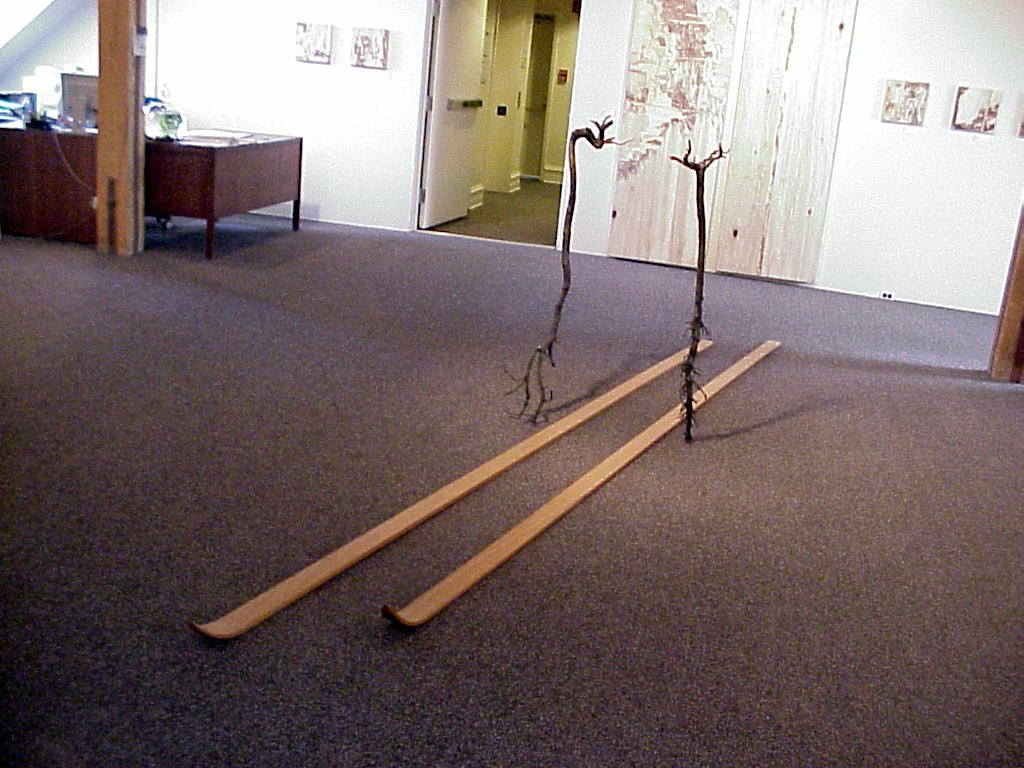
Reinhard Reitzenstein, Jackrabbit, 2005, bronze poles, wood skis
and Giuseppe di Leo's watercolors, but at the opposite end of the spectrum an extra special note that reads in its entirety "DID NOT LIKE YECHEL GAGNON'S CARVED PLYWOOD." Yes when I am writing notes to myself I write in capital letters, it makes it way easier to read what I wrote after the fact. Although yelling at myself doesn't hurt, either.
However, sometimes (not always) I think that there is more to art than a simple "I like" or an "I don't like." And if I spend more than 45 minutes wandering around looking at things it's more than superficial.
So to get down to the real nitty gritty. In the same way that I got confused by the title of the exhibit, my brain got in the way of my enjoyment of Ms. May's "You Are Invited to Dinner" (which by the way is the biggest bargain in the whole freakin' show).
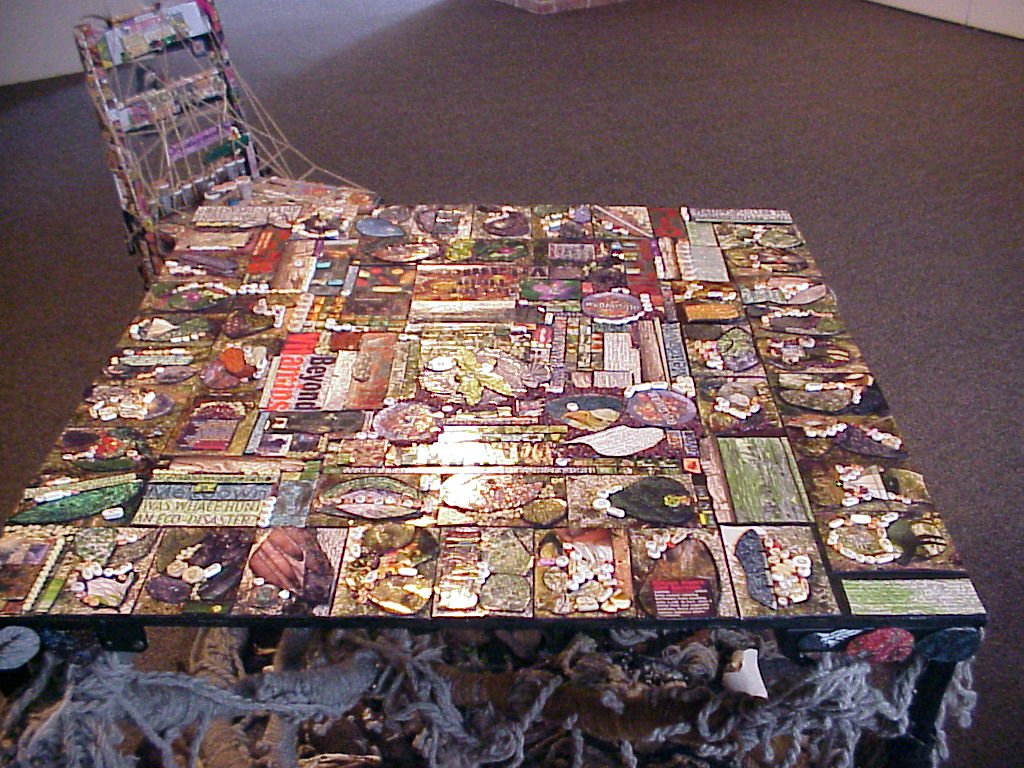
detail of Doris May, You Are Invited to Dinner, 2000-2006, mixed media
There's this thing called "The Dinner Party" by a certain woman who lives in New Mexico which just got in the way of altogether too many of my synapses. Had Ms. May entitled her piece "Let's do Lunch," or "late night snack" I feel that the allusions to Judy Chicago's work would still be there, front and center, but it would not give the appearance of competing or challenging - or it just might be the fact that I have a y-chromosome that makes me think that way - 'cuz as my mother will remind me - women are not as competitive as I am - so it all might be of my own making.
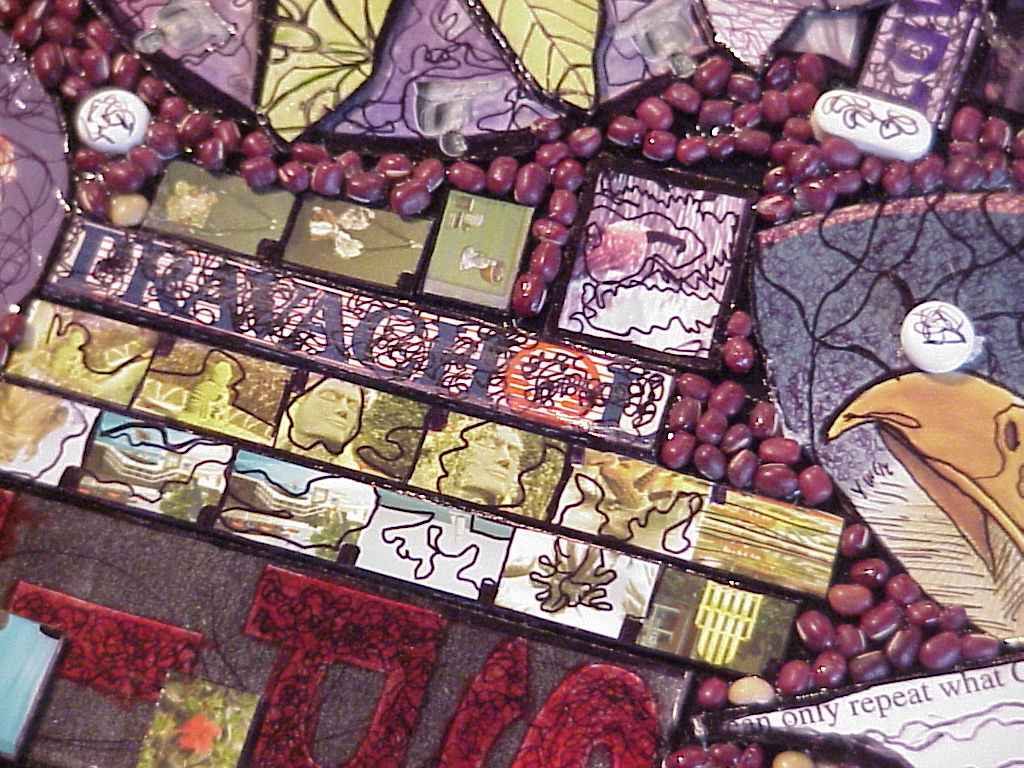
detail of Doris May, You Are Invited to Dinner, 2000-2006, mixed media
But once I stopped thinking and started looking, I was pretty darn impressed. I don't know if you would want to call it; obsessive, compulsive, fastidious, or just being bored with what's on TV and not having anything else to do,
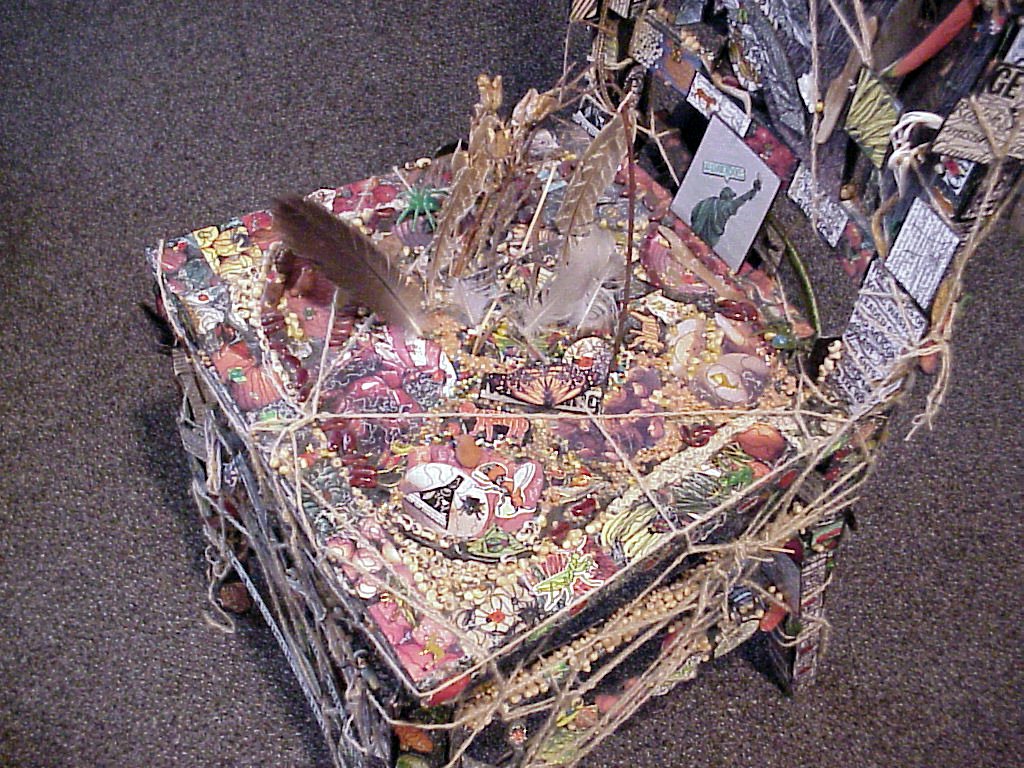
detail of Doris May, You Are Invited to Dinner, 2000-2006, mixed media
but man-o-man the stuff that's in, on and around that table is phenomenal. I wasn't knocked for as much of a loop by Ms. May's other pieces in the show. Given what I know about her work, I think her Christmas tree (next time you see her, ask to see it)
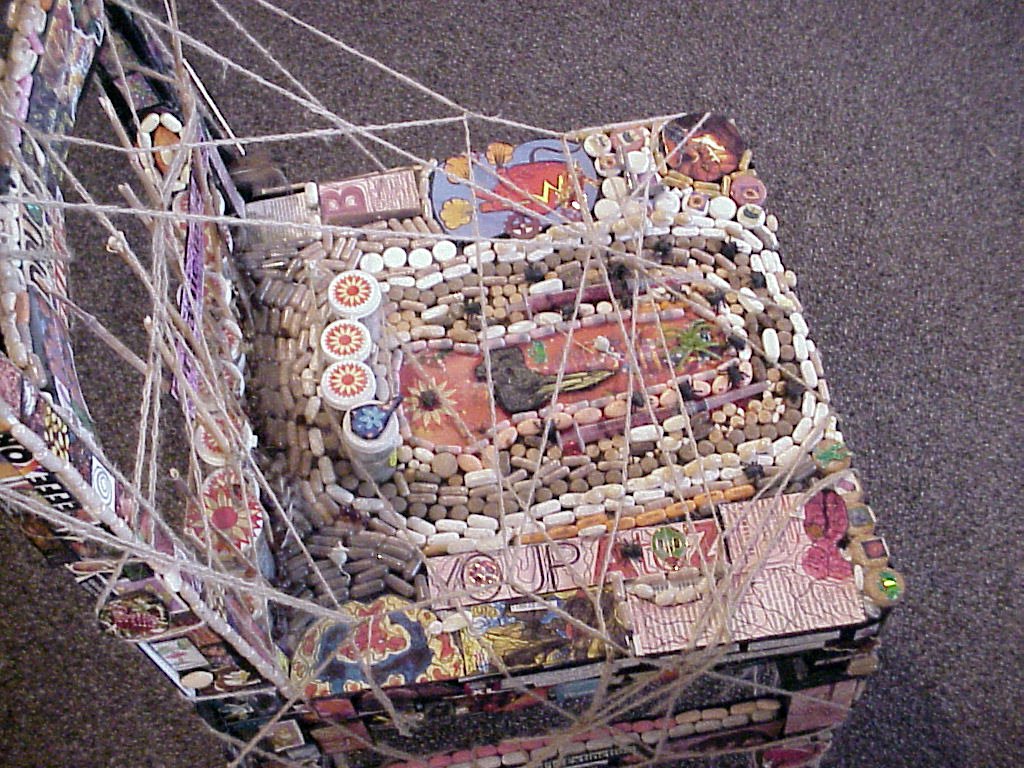
detail of Doris May, You Are Invited to Dinner, 2000-2006, mixed media
or something else in fabric, or using fabric that emulated nature might have served purposes to better effect than the photographs of and referring to nature that were chosen.
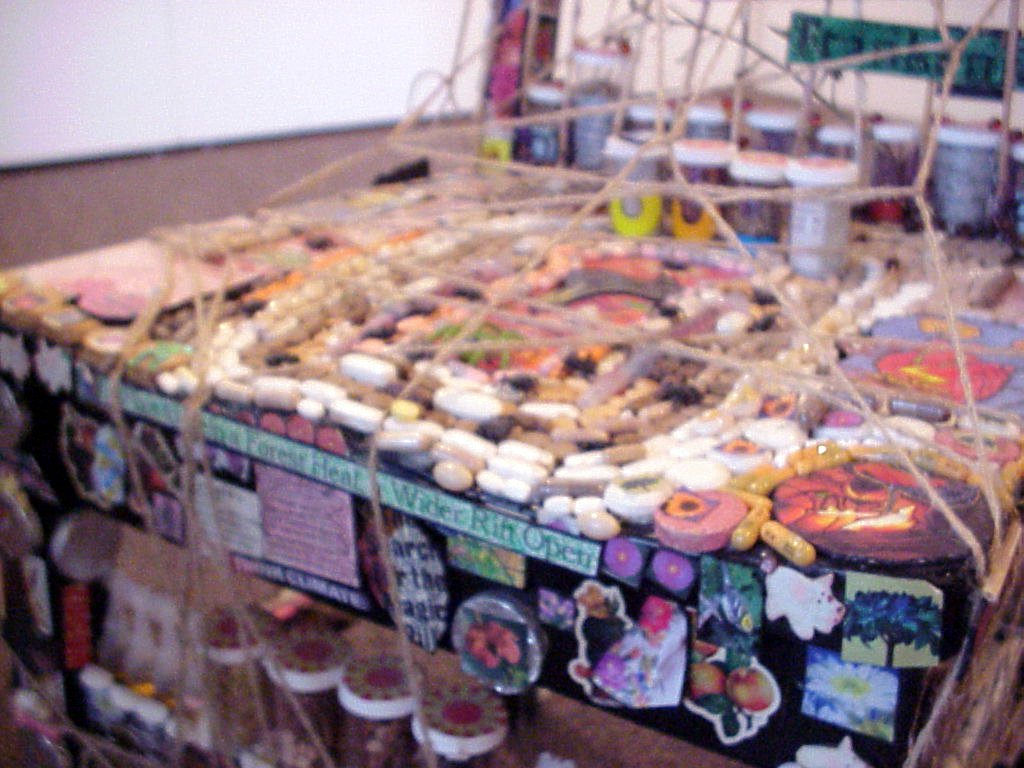
detail of Doris May, You Are Invited to Dinner, 2000-2006, mixed media
I'd seen a couple of Louis Joncas' photographs before, and really big color pictures are pretty much almost always eye-candy unless you completely screw up, in which case you're not gonna be in the show, or your name is Nan Goldin. If you hadn't noticed Mr. Joncas' name ain't Goldin, and he in the show. That being said, as I have mentioned previously, Mr. Joncas' "Unititled, from the Naturalis series" and "Tree" aren't exactly the most original photographs around. But, his Vanitas photo is sorta cool in a dead nature sort of way. I think it has more to do with the way he got the colors to work side by side, than anything having to do with the content of the picture, and it might in fact look even better because of it being hung next to his "Liquid Emulsion" which is black and white. Although once you start to look at what the content of the picture is, it takes on a whole set of new meanings (I certainly hope that the lights in his studio weren't too hot, otherwise it would have stunk while he took the picture).
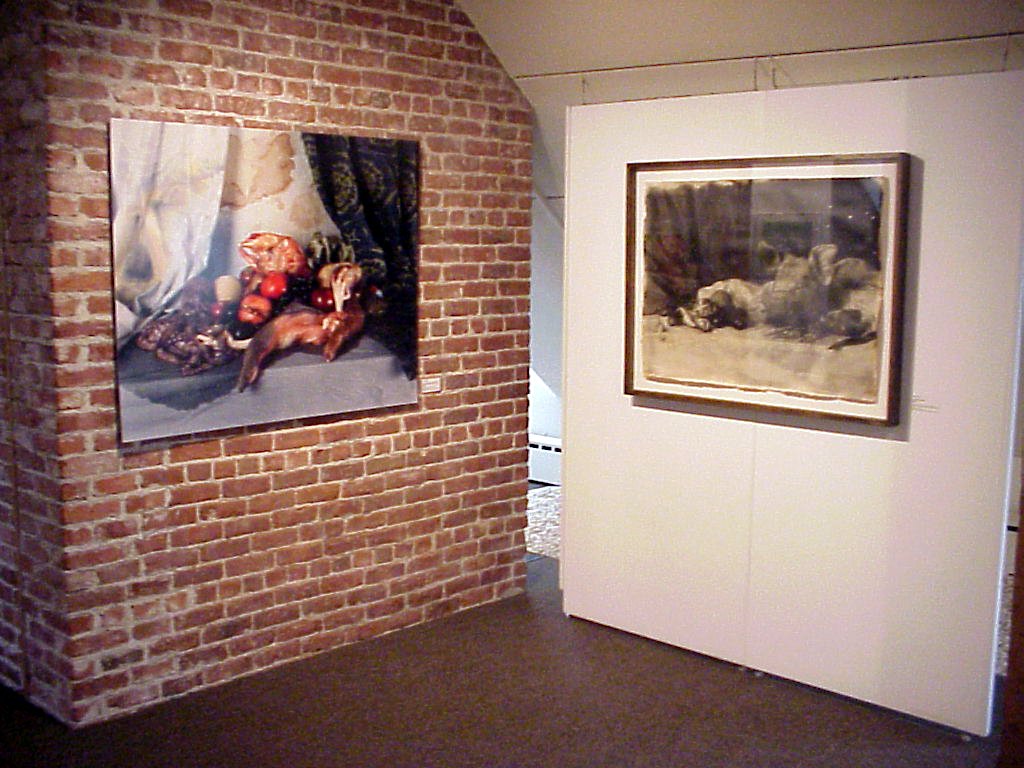
Instalation shot of Nature Wanted... all pieces by Louis Joncas Untitled, from the Vanitas series, and Liquid Emulsion, both 1994
Now to balance the positives... I'm certain I saw Shelley Reeves' work but for the life of me can't remember it at all. And the only thing I remember about Danièle Lemieux's stuff is the one painting entitled "Cast Iron" where I wondered why it had been hung on Plexiglas instead of the fake wall that everything else was on, and then as it is pretty much the first thing you see as you walk in the door why a stronger piece hadn't been chosen for that position.
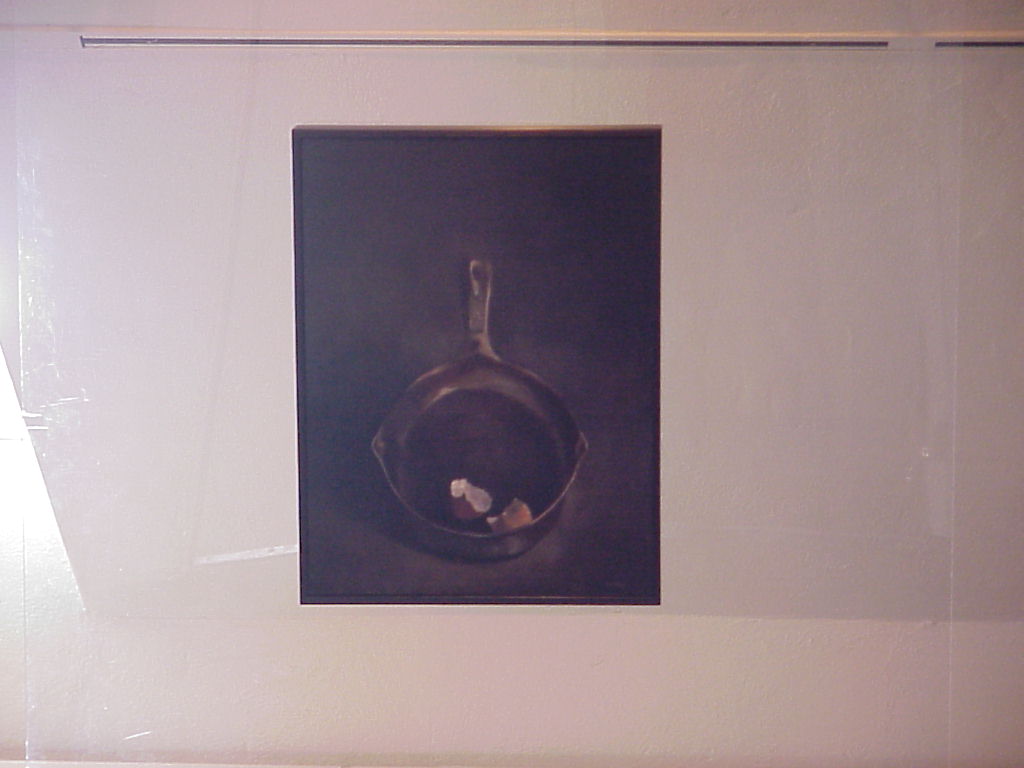
Danièle Lemieux, Cast Iron, 2004, oil
Contrary to what I normally say ("if I can't remember the art it couldn't have been all that good") I'd cut both Ms. Reeves and Ms. Lemieux some serious slack, because I'm writing this only three days after seeing their work, and if I wrote the nasty stuff about Ms. Gagnon's work in capital letters then the worst that could be said about Ms. Reeves and Ms. Lemieux is that they ain't offensive. And now that I go back over the pictures I took and see pretty much your standard issue "nature morte" (still life) I think I was wanting more of a nature vivante sort of art. If I can't remember stuff after a week or a month then it is bad, after a couple of days, I wasn't concentrating while I was there.
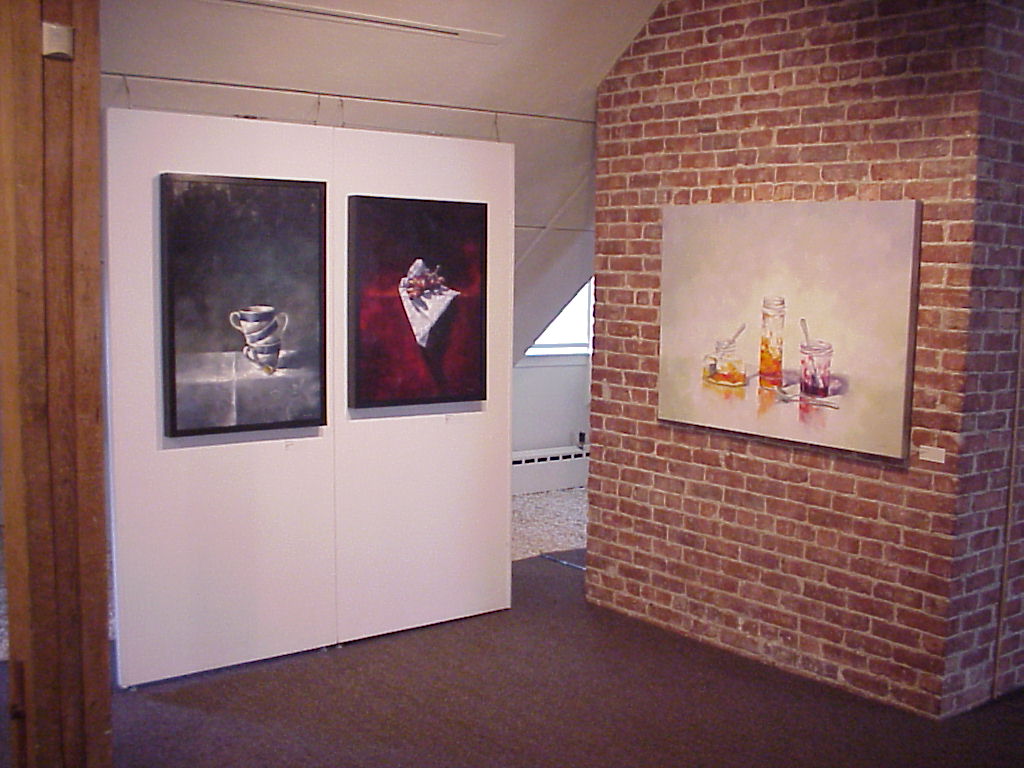
Installation shot of Nature Wanted... all pieces by Danièle Lemieux, Tea for Three, Crimson, Confitures, all 2005, all oil on canvas.
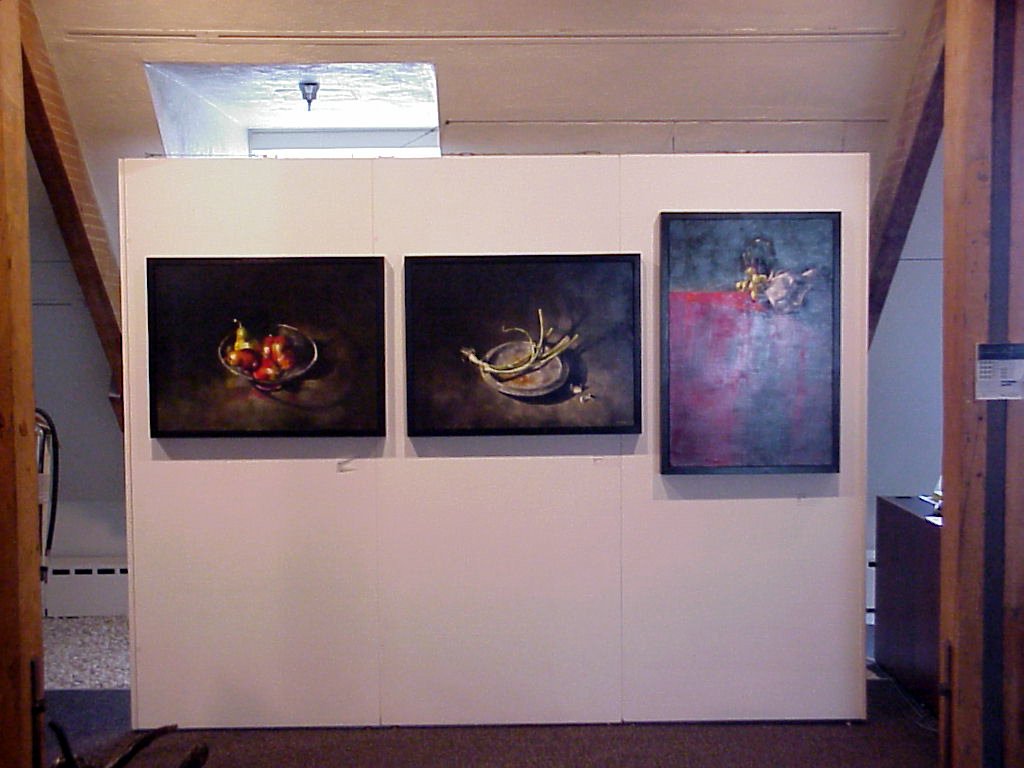
Installation shot of Nature Wanted... all pieces by Danièle Lemieux, Centrepiece II, Green Onions, Table's Edge, all 2005, all oil on canvas.
Speaking of Ms. Gagnon, I'm positive I can make all sorts of jokes at her expense but I will attempt to be diplomatic about it and keep my mouth shut.
Organizing a group show is something I imagine is really really difficult - hence the fact that I only do solo shows here. Getting across a specific point without using words is not easy. When was the last time you played charades? I think I got some of what Joyce Millar was trying to do, and from that perspective I could even understand why she would include Ms. Gagnon's work - but the inclusion of your standard issue still lifes (Ms. Reeves and Ms. Lemieux) did not add anything to the point, and in certain cases actually risked obscuring the purpose of the show.
It's like, I then go over and check out Giuseppe Di Leo's watercolors, and yeah they're your standard issue still lifes, but somehow because he has chosen to paint a propeller a pipe valve and an oil pump along with the flowers that causes me to give his paintings more consideration than I would normally, but even then I sorta step back and realize that there ain't much there.
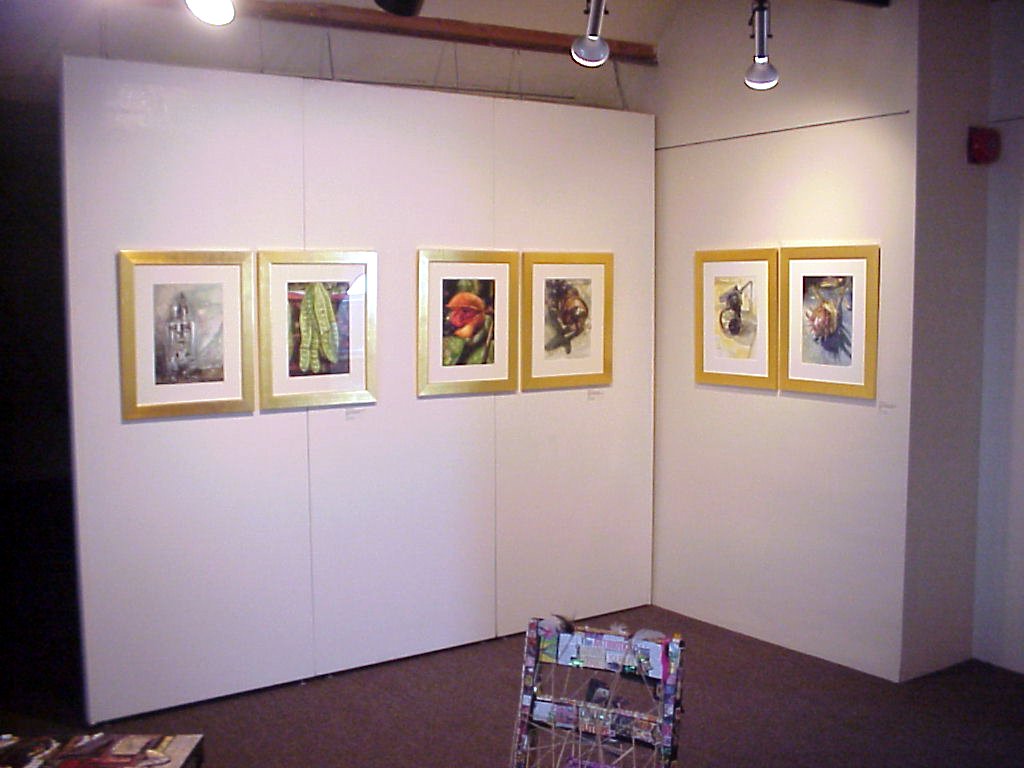
Installation shot of Nature Wanted... all pieces by Giuseppe Di Leo The Sacred and the Prosaic series, 1997, watercolors on paper
But to flip to the other side, if he's the only artist who has succeeded in selling all the pieces included in the show, then maybe there are folk out there who know better than I do. But flopping over here, selling stuff ain't the be all and end all of the show. I find it interesting that he calls his watercolors "The Sacred and the Prosaic." In the history of painting, paintings of flowers are much more commonplace than pictures of hooks. I'm not entirely certain which one I would consider worthy of religious adoration.
Like Ms. Reeves and Ms. Lemieux, Alexandre Masino's paintings fall in between the cracks as well. Not exactly as deep as Ms. Reeves and Ms. Lemieux but still with so much nature vivante in one room a piece of art can't be still if it is gonna garner any attention. Mr. Masino's paintings are made with wax (I think) and in the press release it is mentioned how poetic they are. I think the allusion is dead on balls accurate. To give a slightly more in your face comparison; if Mr. Masino's paintings are like a sonnet, then Ms. May's sculpture is like a the animated version of a Dr, Suess book, and Reinhard Reitzenstein work is like a full blown opera and how're you gonna compete when you are sitting in the same room with Wagner or the Cat in the Hat? Mr. Masino's paintings weren't made of green eggs or ham.
But saving the best for last, Mr. Reitzenstein is the star of the show.
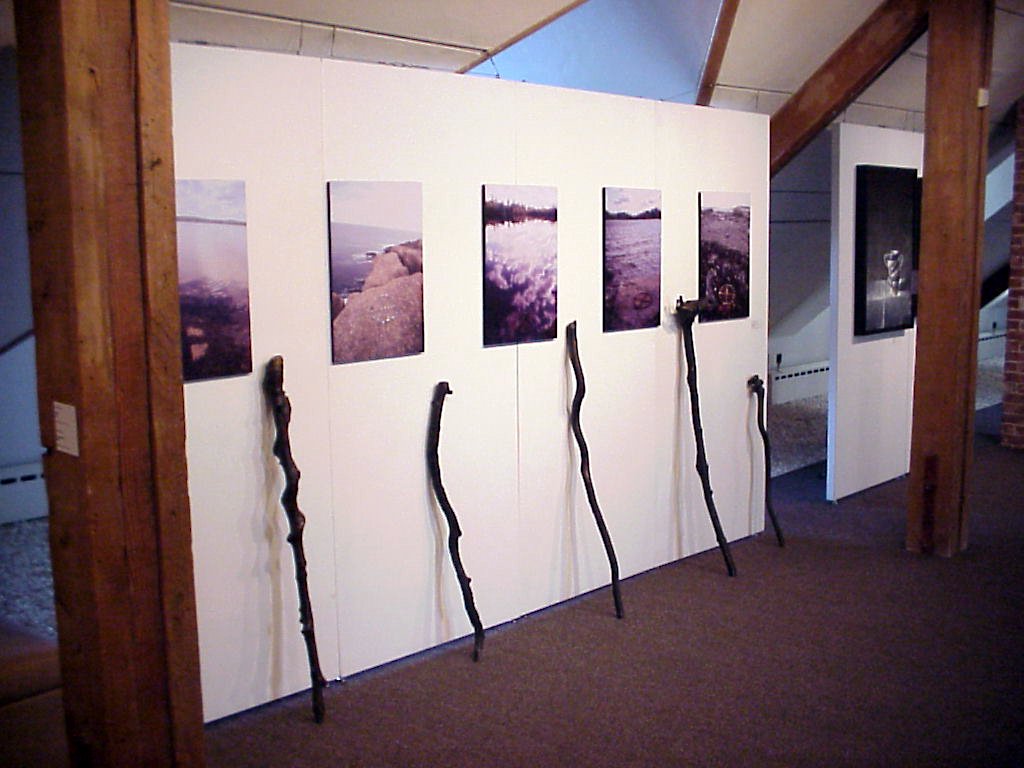
Reinhard Reitzenstein, Wheels and Sticks, 1986-2004, bronze walking sticks & photographs
He works in bronze, for the most part replicating nature. Whether he's making a joke by carving humongous cross country skis with bronze branches as poles (although Mr. Reitzenstein must be a pretty short fellow, as the poles don't look to be the appropriate height) and calling it Jackrabbit, after Johanssen. (quick aside here: Edwin Holgate painted a portrait of Mr. Johanssen, I'd love to know what sort of art collection his kids have...) to being fairly prosaic and casting a stone and calling it "boulder." The centerpiece of the show is a piece called "Stowaway" which is a bronze casting of a bonsai tree that is stuck into a humongous split log.
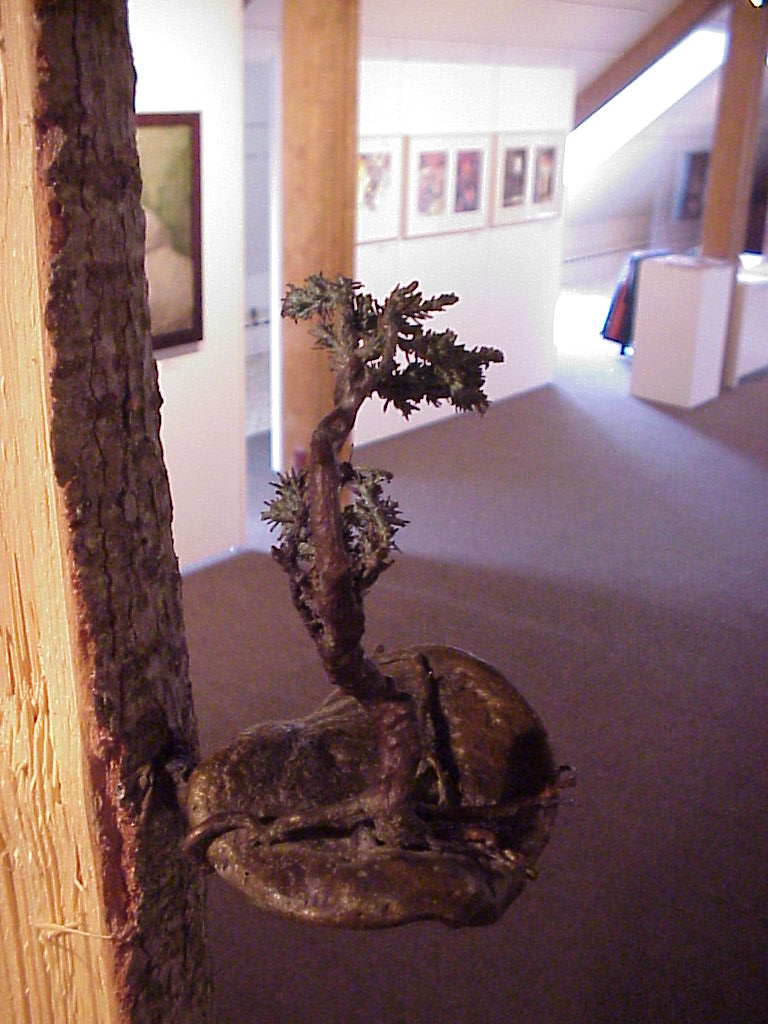
detail of Reinhard Reitzenstein, Stowaway, 2004, tree trunk and bronze cast tree with fungus
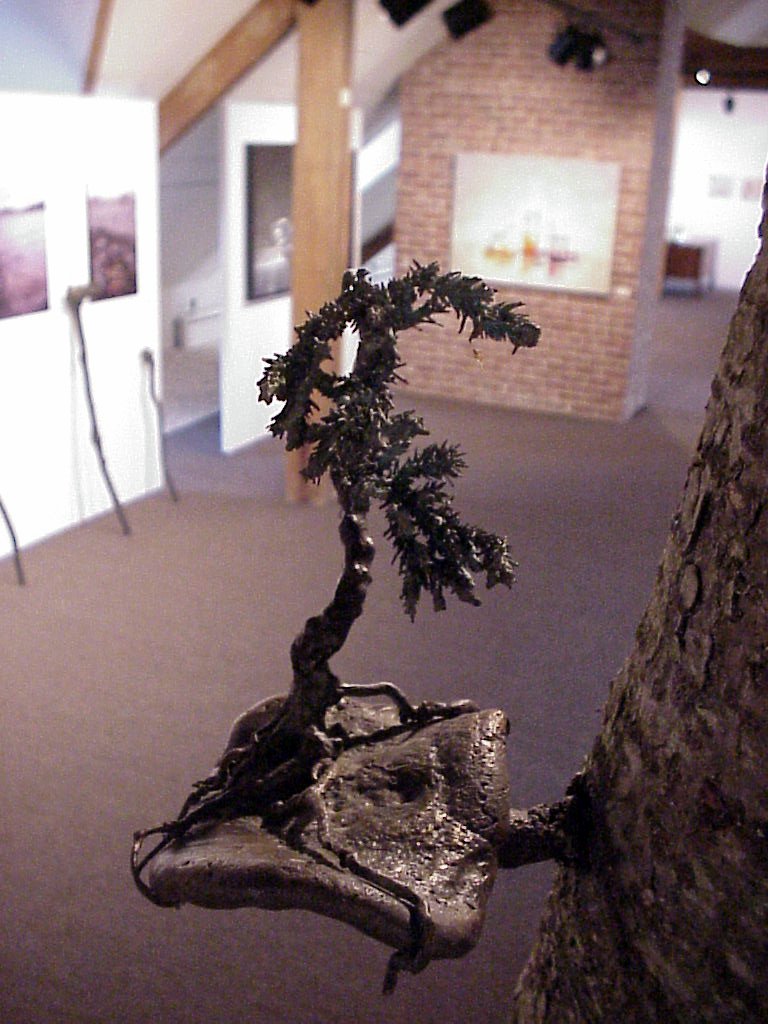
detail of Reinhard Reitzenstein, Stowaway, 2004, tree trunk and bronze cast tree with fungus
Way cool stuff, the only negative thing that I can think is that his wheels and sticks pieces would have been better if he had waited until this year to make the sticks, but then that would have meant that they could not have been in the show as nothing in the art world here in Montréal moves fast enough to incorporate work that is made less than a month before the show. However, I think 20 years apart just would have looked nicer on the wall tags . And let me point out that if, as I said the only negative thing I can think is the date of a piece then the work is pretty darn hot. Oh and I'd be neglectful if I failed to mention that some of the lights were blown when I was there. But unlike a museum that charges me to get in the door and then can't remember that Gerhard Richter wasn't born in the 1800's, I'm willing to cut 'em a little slack. Especially if they arrange to transport me from here, to there. Anybody know how I can get the Getty or LACMA to invite me out to California?
I'm quite happy that Ms. Hofmaenner offered to truck me out to Pointe Claire, if I had organized the show myself, obviously certain things would have been different. But I glom onto the concept that Ms. Millar wanted to show how far things had moved beyond your standard issue Sunday Painting Class's bowl of fruit. Personally, I preferred the stuff that showed how far things had moved from your standard issue still life that hangs in the standard issue museum. But that's just me.
You only have another week to see the show, but thankfully Stewart Hall doesn't do "standard issue gallery hours" they are open Monday through Sunday, and late on Monday nights and Wednesday nights, so it ain't as dire as it sounds, but you're still going to have move sorta quick.
La galerie d'art Stewart Hall Art Gallery
Centre culturel de Pointe-Claire Stewart Hall
176 chemin du Bord-du-Lac/Lakeshore Road
Pointe-Claire (Quebec) H9S 4J7
Tel: (514) 630-1254
Hours:
Monday to Sunday 1 - 5 p.m.
Monday & Wednesday evenings 7 - 9 p.m.
No comments:
Post a Comment